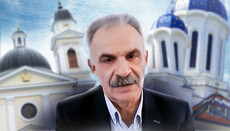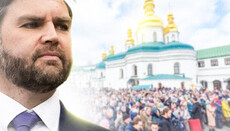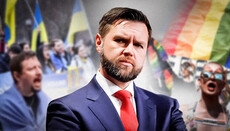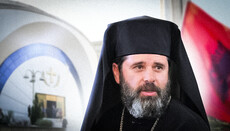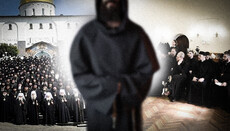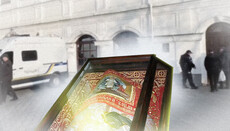10 Church milestones of 2020: outcomes of the outgoing year
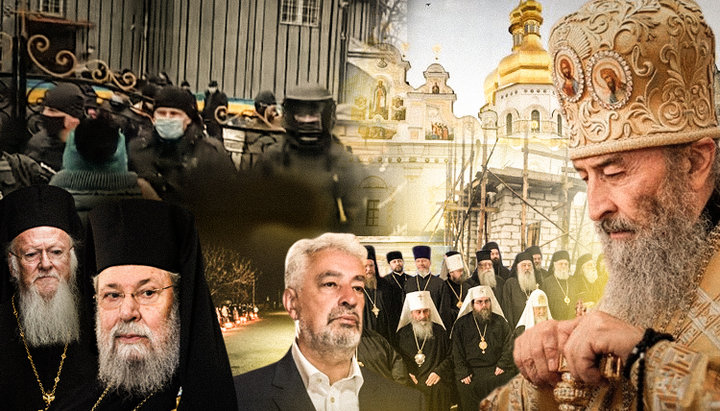
Traditionally, at the end of the year, the UOJ sums up the outcomes and invites its readers to recall those events that have been the most important in 2020.
1. Meeting of Primates in Amman

On February 26, in Amman, the capital of Jordan, at the initiative of Patriarch Theophilos III of Jerusalem, a meeting of the Primates and delegations of the Local Orthodox Churches was held. The meeting was attended by the Patriarch of Jerusalem Theophilos, Patriarch of the Russian Orthodox Church Kirill, Patriarch of Serbia Irinej, Primate of the UOC Metropolitan Onuphry, Metropolitan Rastislav of the Czech Lands and Slovakia, as well as a delegation of the Romanian Orthodox Church led by Metropolitan Nifon of Targoviste, and a delegation of the Polish Orthodox Church led by Archbishop Abel of Lublin-Chelm. At the meeting, His Beatitude Onuphry made a speech in which he elaborated on the actions of the Patriarch of Constantinople in Ukraine, noting that these actions violate the canons of the Church, and only the elimination of these violations can lead to the resolution of the crisis situation.
The meeting participants adopted a final communiqué, in which they:
- pointed out the need for a pan-Orthodox discussion of the situation in Ukraine;
- called for a solution to the ecclesiastical situation in North Macedonia through dialogue within the Serbian Church with pan-Orthodox support;
- called on the authorities of Montenegro, where an anti-church law was adopted, aimed at depriving the Serbian Church of its church property, to respect and observe fundamental property rights;
- came to a consensus on the need to hold a new meeting to strengthen fraternal relations.
- Patriarch Bartholomew expressed his sharp condemnation of this meeting.
2. Easter during the quarantine
In 2020, part of Lent and Easter fell on a quarantine period due to the coronavirus epidemic. In the country, there were restrictions on gatherings of people, public transport did not work, enterprises and institutions were closed. The quarantine also affected the Church: the rectors were forced to hold services outdoors or in churches but with a limited number of people. Despite this, Easter services gathered a large number of believers, who, observing all sanitary standards, were able to celebrate the main Christian feast in churches.
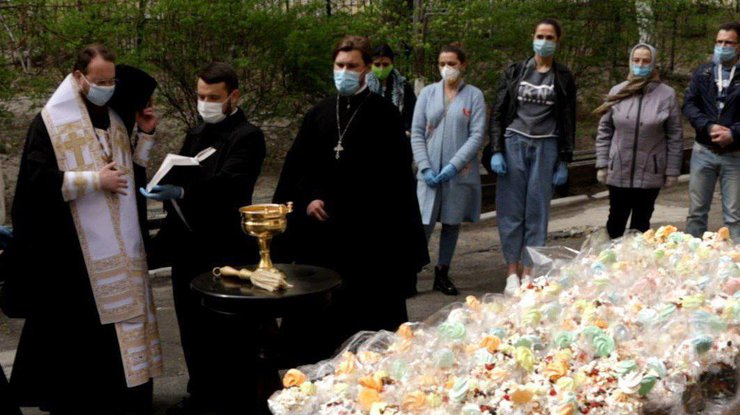
This time was remembered for the real hysteria in the media directed against the hierarchs of the Ukrainian Orthodox Church. The bishops were reproached for not closing the doors of churches in front of their parishioners and were given examples of the OCU and the UGCC, where services were held behind closed doors. The UOC was accused of "anti-state activities" and a supposed surge in the incidence after Easter. The Kyiv-Pechersk Lavra, where a large number of monks fell ill with COVID in the spring, suffered real persecution.
Despite all the reproaches, there was no outbreak of illness after the Easter celebrations.
3. Cancellation of Great Cross Procession – 2020
In connection with the coronavirus epidemic, the UOC cancelled the cross procession on the Day of the Christianization of Rus’ and the memory of St. Prince Vladimir. The order sent by His Beatitude Metropolitan Onuphry to the eparchies of the UOC said: “It is not possible to hold a traditional Religious Procession with the participation of the episcopate, clergy, monastics and laity. In this regard, on July 28, 2020, in all churches and monasteries of the eparchy entrusted to you, it is necessary to perform a prayer service with a festive chime.”
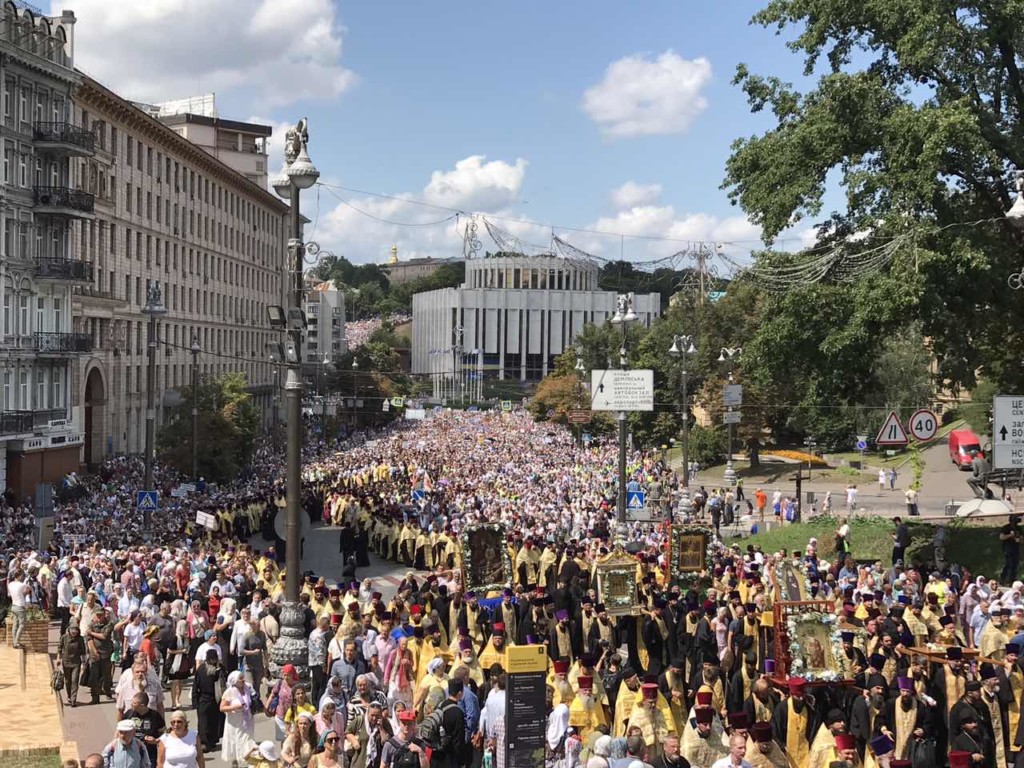
In recent years, the Cross Procession on July 27 has become a real event for the believers of the UOC, which they have been looking forward to and for which they have been preparing for a long time. Therefore, to a certain extent, the decision to cancel the procession was a disappointment. However, the members of the Church understood that it was dictated by a concern for the health of the people and demonstrated the patriotic civic position of the hierarchy of the UOC.
4. 30th anniversary of the formation of the Ukrainian Orthodox Church
On October 25-27, 1990, the Council of Bishops of the Russian Orthodox Church decided to abolish the Ukrainian Exarchate and form the Ukrainian Orthodox Church with the status of autonomy. The UOC was granted the right to independently elect Primates and bishops, to establish and abolish eparchies, and resolve all issues of internal governance. On October 28, 1990, the Letter of His Holiness Patriarch Alexy II on the independence and self-governance of the Ukrainian Orthodox Church was solemnly read out at the St. Sophia Cathedral in Kyiv.
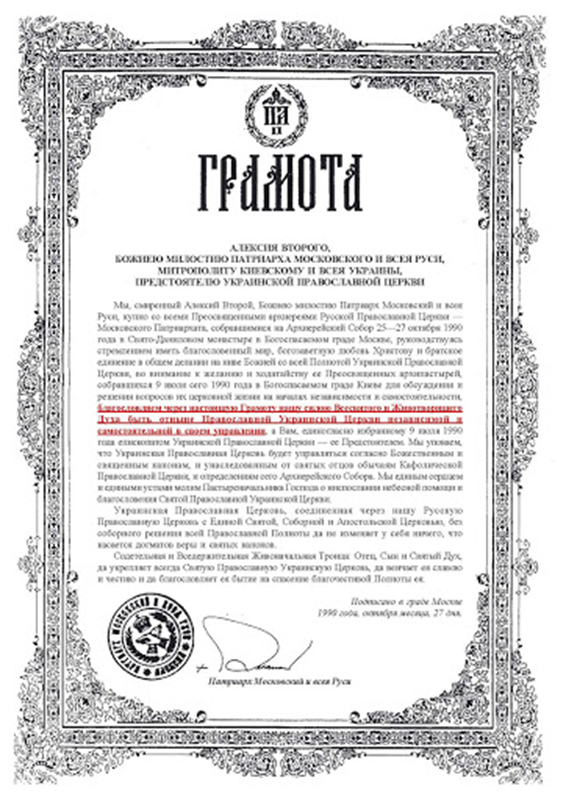
With the blessing of His Beatitude Metropolitan Onuphry, in connection with the spread of COVID-19, instead of a solemn service in Kyiv with the participation of the episcopate of the UOC, the celebration of the 30th anniversary of the formation of the UOC took place in the cathedrals of the eparchies.
5. Recognition of the OCU by the Orthodox Church of Cyprus

On November 25, 2020, the Holy Synod of the Orthodox Church of Cyprus, by a majority of 10 to 7, recognized the OCU, though even at the previous meeting of the Synod, on November 23, the opponents of the OCU prevailed. The recognition itself took place in an unusual form, the Synod said that it "does not object to the decision of his Beatitude" Archbishop Chrysostomos, who on October 24, 2020, commemorated the head of the OCU Epiphany Dumenko during the divine service. This decision of Archbishop Chrysostomos caused a sharp rejection of a whole group of Cypriot bishops, and some of them said that they would not concelebrate with Archbishop Chrysostomos since he commemorates a person who has not been ordained. In response, Archbishop Chrysostomos threatened to defrock these bishops. The crisis in the Church of Cyprus has not been resolved yet.
6. Victory of the Church proponents in the parliamentary elections in Montenegro
At the end of December 2019, the parliament of Montenegro adopted an anti-church law, according to which the canonical Montenegrin-Littoral Metropolis of the Serbian Orthodox Church was deprived of its property and, in fact, was outlawed. Its place was to be taken by the schismatic Montenegrin Orthodox Church. In response, the Church and the people of Montenegro expressed a decisive protest in the form of mass cross processions, the number of which reached 250 thousand people (the entire population of the country – 600 thousand). The Ukrainian Orthodox Church also expressed solidarity with their brothers in Christ in Montenegro.

On August 30, 2020, at the parliamentary elections in Montenegro, the people refused to trust the ruling party, which pursued an anti-church policy and supported the opposition. To date, the new government of Montenegro has cancelled the provisions of the law that infringed on the rights of the Church. The Church won, but the persecutions raised by the authorities exhausted the strength of the two confessors of the Serbian Church. On October 30, 2020, Metropolitan Amphilochios of Montenegro and the Littoral departed to the Lord, and on November 20, Patriarch Irinej of Serbia reposed.
7. 30th anniversary of the episcopal ordination of His Beatitude Metropolitan Onuphry
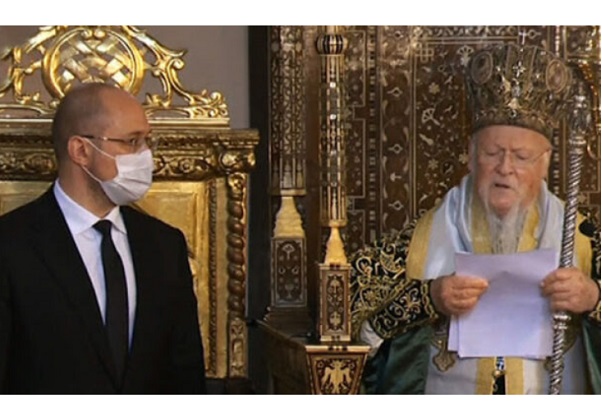
On December 9, 1990, at the St. Vladimir Cathedral of Kyiv, Archimandrite Onuphry was ordained as Bishop of Chernivtsi and Bukovyna. He served in this position for 24 years, after which, on August 13, 2014, the Council of Bishops of the UOC elected him the Primate of the Ukrainian Orthodox Church. On the day of the 30th anniversary of this event, the bishops, clergy and believers of the UOC prayed with their Primate at the Holy Dormition Kyiv-Pechersk Lavra.
It is noteworthy that on the eve of the solemn date, His Beatitude Metropolitan Onuphry gave an interview in which he called the years of his life when he served as a common hieromonk as the happiest ones.
8. Seizures of temples
In 2020, the violent seizures of UOC churches and the illegal re-registration of communities to the OCU continued, although not at the pace that happened under Poroshenko. According to the head of the UOC Representation to European international organizations, Bishop Victor (Kotsaba) of Baryshevka, in recent years 122 churches have been seized and 220 parishes have been illegally re-registered to the OCU. All these crimes, as a rule, are committed with the knowledge and approval of the OCU leadership. In many cases, UOC believers endure threats and beatings.
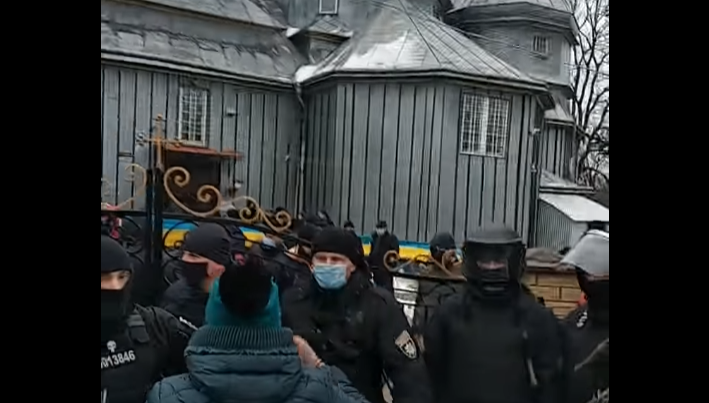
The UOC Chancellor, Metropolitan Anthony (Pakanych) of Boryspil and Brovary, said that the head of the Phanar, Patriarch Bartholomew, is personally responsible for raiding, violence and other illegal actions that the supporters of the OCU commit against the believers of the Ukrainian Orthodox Church.
Recently, the topic of church seizures by representatives of the OCU has received another interesting note. Filaret Denisenko, the head of this structure, spoke about this problem already in relation to the UOC-KP. And this is despite the fact that it was the Kyiv Patriarchate, before the formation of the OCU, that initiated the seizures of UOC churches.
9. Building temples
People who take over churches are usually very far from praying in them. Therefore, in most of the temples seized by the schismatics, "services" are either not held at all or their number is significantly reduced. But even where they are, the number of parishioners is very small. On the contrary, the communities of the UOC, which have lost their churches but remained faithful to their Church, are building new churches for themselves with the help of God and the efforts of caring people.

Reports of the construction, beautification or consecration of churches in communities affected by raider attacks appear almost every week. With the blessing of the Holy Synod and the Primate of the UOC, the “Favor” Charitable Foundation makes a significant contribution to this good cause. We should also note the benefactor and philanthropist Andrey Biba, through whose efforts many churches were built for the affected communities in Western Ukraine.
10. The invitation of the head of the Phanar to Ukraine and the return of the religious policy of P. Poroshenko
Former President of Ukraine P. Poroshenko, contrary to the Constitution, actively and directly interfered in church affairs. He was one of the founders of the OCU, his name is even mentioned in the text of the Tomos. His religious policy was that the OCU is the support for Ukrainian statehood and, accordingly, the state should provide it with all-round assistance. P. Poroshenko tried with all his might to convince the Ukrainians that the UOC is the structure of an "aggressor state" and it must be destroyed by uniting with the OCU. The people assessed such a policy in the 2019 presidential elections when P. Poroshenko suffered a crushing defeat from V. Zelensky, who promised to follow the Constitution and not interfere in church affairs.
In the first years of the presidency, this promise was at least kept alive, but then there was a sharp change in the course. On October 16, 2020, V. Zelensky paid an official visit to the Phanar, during which he attended a prayer service at St. George's Church (this has never happened in Ukraine) and also met with Patriarch Bartholomew of Constantinople. The President invited the head of the Phanar to Ukraine, and the latter planned a visit to celebrate the country's Independence Day on August 24, 2021. And on November 30, 2020, the Prime Minister of Ukraine Denis Shmyhal visited the Phanar. He took part in the Divine service together with Patriarch Bartholomew and representatives of the Roman Catholic Church and also stated that the Ukrainian state not only fully supports the OCU but also finances this structure. He described the OCU as a "reliable partner of state institutions" and agreed on the details of Patriarch Bartholomew's visit to Ukraine.
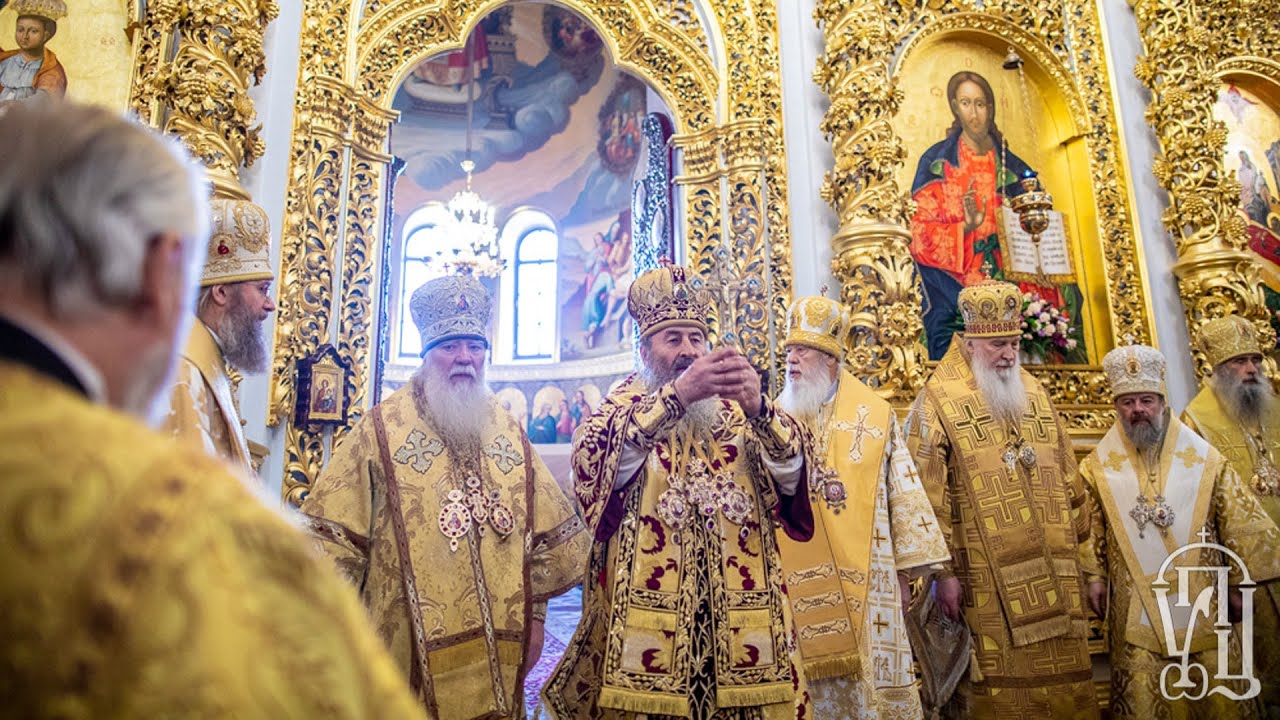
The return of P. Poroshenko's religious policy means renewed persecution of the UOC by the state and various political and public activists, and the planned visit of Patriarch Bartholomew to Ukraine will only deepen the division in Ukrainian society and exacerbate inter-faith enmity.
Metropolitan Anthony of Boryspil and Brovary, regarding the visit of the head of the Phanar to Ukraine, said the following: “One should fear that the visit of the Patriarch of Constantinople to Ukraine will provoke a new round of conflicts and confrontations on religious grounds. After all, supporters of the OCU and their lobbyists in the power structures may decide that this visit is a signal of support from the official Kyiv for the Phanar's course in relation to the church sphere of Ukraine."
Therefore, the Ukrainian Orthodox Church is entering the next 2020 year with alarm about a possible resumption of persecution, but at the same time with the hope for God's help, with which it is possible to overcome all trials on the way to the Kingdom of Heaven, remembering the words of the Apostle Peter:
“Beloved, do not be surprised at the fiery ordeal that has come on you to test you, as though something strange were happening to you. But rejoice inasmuch as you participate in the sufferings of Christ, so that you may be overjoyed when his glory is revealed. If you are insulted because of the name of Christ, you are blessed, for the Spirit of glory and of God rests on you. If you suffer, it should not be as a murderer or thief or any other kind of criminal, or even as a meddler. 16 However, if you suffer as a Christian, do not be ashamed, but praise God that you bear that name,” (1 Peter 4: 12-16).
